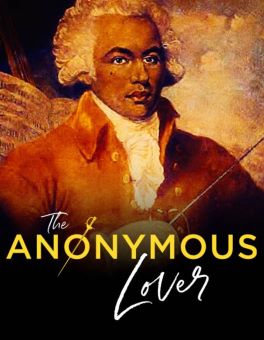ANONYMOUS NEGLECTED NO MORE
L.A.’s Colburn School and LA Opera will stage and stream the company premiere of The Anonymous Lover (L’Amant Anonyme), a charming and unjustly neglected 1780 opera by Joseph Bologne, Chevalier de Saint-Georges (1745-1799), a contemporary of Mozart who is widely regarded as the first Black classical composer known to history. Performed in a socially distanced setting the performance will be streamed online for free on Saturday, November 14th, 2020, at 5pm (PST). The singers, staged by Bruce Lemon, Jr., will perform in Zipper Hall while the orchestra, led by James Conlon, plays nearby at the Grand Rehearsal Hall. This is the inaugural presentation of LA Opera’s On Now initiative to make streaming a permanent part of its programming. Free digital tickets for The Anonymous Lover are now available at LA Opera.
The comic romance tells the story of Léontine (soprano Tiffany Townsend, below), a beautiful young widow who has become disillusioned with the idea of love. For years, she has received a steady stream of love letters and gifts from an unknown man who professes his undying passion. This amuses her friend Valcour (tenor Robert Stahley, below), who also claims to have no interest in affairs of the heart. But now, after hiding his true feelings for so long, Valcour finally works up the courage to reveal that he himself is Léontine’s devoted secret admirer. Will his awkward confession sway a heart sworn to resist all affection?

 Soprano Alaysha Fox appears as Léontine’s friend Dorothée and baritone Michael J. Hawk is Ophémon, enlisted by Valcour to assist in the deception. (As Dorothée, originally a non-singing role, Fox will sing an aria from Bologne’s first opera, Ernestine, of which only fragments exist today.) Mezzo-soprano Gabriela Flores and countertenor Jacob Ingbar portray the young lovers Jeannette and Colin, whose wedding provides a delightful backdrop for the opera’s happy ending.
Soprano Alaysha Fox appears as Léontine’s friend Dorothée and baritone Michael J. Hawk is Ophémon, enlisted by Valcour to assist in the deception. (As Dorothée, originally a non-singing role, Fox will sing an aria from Bologne’s first opera, Ernestine, of which only fragments exist today.) Mezzo-soprano Gabriela Flores and countertenor Jacob Ingbar portray the young lovers Jeannette and Colin, whose wedding provides a delightful backdrop for the opera’s happy ending.
Colburn Conservatory students will perform works by Bologne and other Black composers during LA Opera Connects November 7 seminar, as part of a session exploring the lost music of composers of color from Colonialism through the late 19th century. The Viano String Quartet will perform Bologne’s String Quartet Op. 6, No. 1 as part of their December 20 Colburn Artist Series performance.
Viano String Quartet. Photo by Jeff Fasano.
The Anonymous Lover premiered on March 8, 1780, in the private theater of the Marquise de Montesson, wife of the Duke of Orléans, who appointed Bologne as the music director of her theater and gave him a residence in the ducal palace. The libretto was adapted from a play by the celebrated writer Madame de Genlis. It is the only one of his operas that survives in complete form.
The opera follows the conventions of 18th-century French opéra-comique, which include spoken dialogues between the arias and ensembles, as well as prominent dance numbers. LA Opera’s performance will be sung in the original French (with English subtitles), with the dialogues spoken in English translation.
Joseph Bologne, Chevalier de Saint-Georges (1745-1799)
Joseph Bologne was born in 1745 on the French Caribbean island of Guadeloupe, the son of an enslaved woman of Senegalese origin and a French plantation owner. When Joseph was eight, his father sent him to France to be educated, and he remained there for most of his life.
He first came to fame as the best fencer in France. At the age of 17, Joseph was made an officer of the king’s guard and given the title “Le Chevalier de Saint-Georges.”
He began his professional career as a musician with Les Concerts des Amateurs. He made a sensational debut as a soloist with that orchestra in 1772, playing two violin concerti of his own composition. The following year, he was named the orchestra’s conductor. Under his leadership, it became regarded as the finest orchestra in Paris and one of the finest in all Europe.
In 1781, Bologne became director of a newly formed orchestra, Le Concert Olympique. He notably conducted the world premieres of Haydn’s six “Paris Symphonies” with that orchestra in 1786. Throughout this decade, he composed string quartets, violin concertos, symphonies concertantes, operas and other works.
When the French Revolution broke out, he distinguished himself as a war hero. In 1791 he was appointed the colonel of the Légion Franche de Cavalerie des Américains (American Free Legion of Calvary), which was composed mostly of men of color; it soon became known as the Légion Saint-Georges. After the Revolution, his close ties to the aristocracy made him the object of suspicion. He was jailed without a trial in 1793, on false charges, for nearly a year.
In 1797, he became director of a new orchestra Le Cercle de l’Harmonie, which he led for the final two years of his life.

